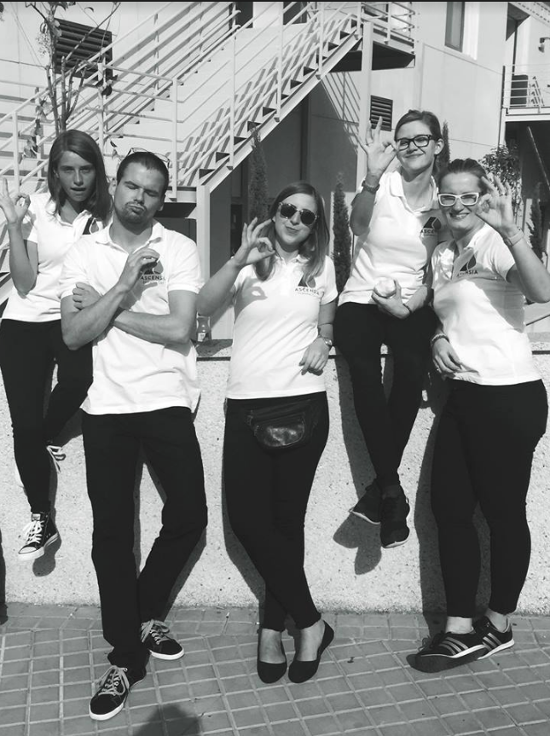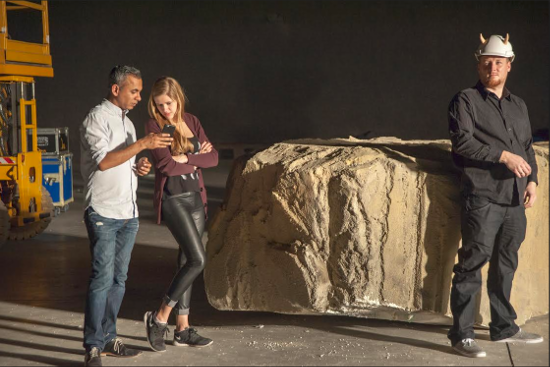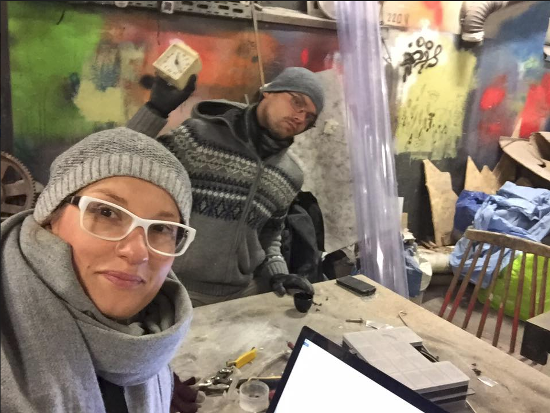
The New Cool: Why Katowice is Poland’s Answer to Berlin

Three years ago Ravi Ruparel
set up Pl-atform, a London-based agency creatively fuelled
by a dynamic team of artists and tech-experts in Katowice, Poland. Having used
this cross-continent approach to create experiential advertising for big brands
like Novartis, Asda, and Greggs, to music stars ACDC and Imagine Dragons, Ravi
explains why Katowice is a melting pot of talent and destined to be the next
Berlin.
LBB> How did you
first find Katowice?
RR> Purely because of friendship.
In my last business we grew a digital agency network, and we
initially wanted to test our international structure, operations and processes
somewhere close to home, but not the U.S. or ANZ. We met a guy in the UK, who
had moved back home to Poland with his wife and child, and we liked him so much
we gave him a test project to work on.
Within 18 months we had built a Polish business in Katowice
with 70 people. That whole business was sold to WPP, and the office continues
happily as part of a major agency network.
The friendships that were built in that time are lifelong,
and what I discovered is that the people of Poland have a very similar sense of
humour and wonderful work ethic. At the same time – life in London over the last
five to six years has become expensive, fast paced, unstable, and people don’t
have the same purpose.
So having access to a pool of people that are friends, had
cool ideas, and were financially liberated enough to be creative, made it the
ideal place to find the best talent. Of course there is an economic advantage
but that’s not the primary reason.
LBB> What was the
idea behind Pl-atform?
RR> We wanted to avoid the pressure of having a huge
number of people on the payroll, being under pressure to sell them to clients, but
instead focus on a very small talent of people who could work together to come
up with amazing ideas and then make them happen. I wanted to open a new type of
agency that worked collaboratively and delivered great tangible experiential campaigns
directly to the client, while operating in a lean and efficient way. Everyone
says that but the DNA of that is that we wanted to focus on ideas. We work with
a huge number of experts, have a tight ideas and a focused team.
Having made my connections and fallen in love with Katowice,
I knew it was the perfect place where we could find real artists, craftsmen and
tech experts to bring ideas to life. The company name itself is indicative of
the motivation – I had always intended to give Polish people a stage, and the
spelling ‘Pl-atform’ is in reference to the internet domain for Poland (PL).
The lifestyle and the passion of the people has been a huge
asset to our business and over the last three years we’ve built a small core
team to collaborate with experts across the Silesian region in which Katowice
sits.
LBB> What talents
make up the Katowice team?
RR> The team in Poland includes video producers, creative
directors, animators and project managers. We collaborate with agencies, not
individuals, that specialise in anything from sculpture building to augmented
reality, virtual reality, 3D, film, and even explosives. We draw upon the
talent that already exists within the community.
Aleks has been there from the start and keeps everything
together. Having worked in Dublin and travelled the world, she has the
experience and skill to keep the plates spinning.
Dorota, who has just come back from maternity leave, is a
graduate of journalism, social sciences and English philosophy. She manages
digital innovation projects for Universal. She has done everything from develop
apps and games for musical artists, to demolishing rocks in a quarry (for
ACDC).
Piotr our film producer is a former barman with a lifetime
of movie making experience and passion. Przemek, our newest member and still at
Uni, is a brilliant web designer. And when he’s not coding, he’s an avid drummer.
But mostly he just loves IT!
If you have seen our logo – that was painted by Daria, one
of our creatives. She is a fine artist turned street artist and now even paints
tattoos. She works on many projects including 2D graphic animation, and in her
spare time she runs a ‘chill-out painting class’, a chance for locals to paint
and relieve stress.

Above: The Poland
and London teams together in Madrid
LBB> What sets it
apart from other emerging cities of culture?
RR> Katowice has always been the underdog – always trying
to punch above its weight.
It’s had a lot of investment in change because of the
decline of the mining industry. Road infrastructure, airports, buildings; it’s
where several leading big businesses have chosen to base their European operations.
PWC, T-Mobile, IBM; they all have big offices there. It is favourable because after
the investments the infrastructure is very good. It also has a lot of young
people, and the attitude of being the underdog, so it wants to prove itself. I
am sure there are a number of similar areas in the world or in Poland that have
the same sort of mix, but having that collision with great people and
friendship that has meant it’s a great place to grow a business. And I think
that’s ultimately the edge – the people of Katowice have been easy to work
with, creative and friendly.
Mark my words – Katowice is the next Berlin!
LBB> That is a big
statement – what makes you say that?
RR> They have both had to evolve, change and reimagine. And
just as Berlin became known as the frontrunner of cultural cool in Europe, Katowice
is now moving towards that title.
After the wall came down in Berlin, new things were created
and the city became a hotspot of inspiration. It remains the epitome of cool.
But it is not the only place where dramatic change has led to this sort of
creative outlet.
People don’t talk about it but formerly the main reason
people went to Katowice airport was to visit Auschwitz. They saw a huge decline
in the mining industry, and found themselves in a pretty undesirable position.
But they did something about it and made a positive change.
It is now a melting pot of culture and events. The annual Katowice Street Art Festival is
a huge event and last year the city was named a UNESCO
City of Music. There are so many new initiatives and projects, and the
people are the driving force behind it.
The people saw an opportunity to become cultured, and
ultimately cool.
LBB> Define ‘cool’?
RR> By cool I mean that the world recognises it for new
value and new ideas.
We think that, for whatever number of reasons, things have
collided and this area is generating new ideas through passion, experience,
education, and attitude. The work we are creating is cool and makes people
smile.
And clients are buying it.

Above: Blowing
up rocks for ACDC at the Alvernia Film Studios
LBB> What other kind
of business is Katowice suited to?
RR> It’s got everything. Aside from the major company
office I mentioned there are call centres, IT helpdesks, creative digital
geniuses, incubators, and technology parks. And then there are a host of
classic industries making things. We make so much in Katowice, there are people
that can build something out of code, neon or clay. It’s got the full broad mix
of everyone and every trade.
We do 50 percent of our work in Katowice and neighbouring
cities. And then 75 percent within the whole of the Silesian region. We have
very rarely veered away from that.
LBB> What does the
economic advantage mean for clients?
RR> We will often go into a client and they will be
confused about what we have just quoted them – is it a day rate or an hour
rate? Because a lot of agencies around the world have become quite expensive.
We are not trying to make our profit on reselling, on buying people for £100
and selling them for £500. We want to do lots and lots of cool work for lots of
people. Make it affordable to take creative risk.
We can bring in right talent, for the right idea, for the
right client – as opposed to sell them the resources that we have like so many
agencies are forced to do today. This has meant that although in the last three
years we have had a core team of six or seven people, we’ve collaborated with
over 300 people and delivered projects in 15 countries, engaged over 100m
people with the activities that we’ve done, and worked in sectors from
healthcare to football. 75 percent of the creative production has come from
Poland.
We are about good creative ideas and working
collaboratively. Working with experts with an economic advantage, on top of
great creativity, has made for a real sweet mix of things to deliver to our
clients.
LBB> What changes
have you seen in Katowice in the last 7 years?
RR> The investment is materialising. In the beginning I
think the first phase was about learning and now a lot of that learning has
been done.
Today the people here are as tuned into global creative
knowledge as someone based in London or New York. That is a huge change, because
now they are not a hidden element of the business. My team in Poland is not a
cheap workforce but a huge asset and they have travelled to meetings across the
whole world, from Switzerland to New York.
The big difference is that in Katowice people don’t have
those same life pressures as London or New York. House prices haven’t gone up
five times, people’s salaries allow for affordable living, so that gives them
the freedom to explore hobbies and I think they’ve become mature in their world
outlook without having the financial pressures of the big cities.
They are lucky to have the mental creative space and enjoy
life. Walk to work, cycle to work, and not worry about how to pay the bills
next month. It makes it a great place to
be.
I have also seen a big shift in supporting women in the
workplace. Dorota is one of the coordinators of Geek Girls Carrot – an
organisation that supports women in technology. They meet once a month to talk
about promoting women in tech and pursuing career goals, whilst juggling the
work-life balance.

Piotr and Aleks Making Sculptures in the studio
LBB> Where is Katowice
heading in the next five to ten years?
RR> I think that Brexit is going to have a massive impact
on Poland. Nobody quite knows which way it’s going to go but today the exchange
rate is working against the pound, so there is a 25 percent change in the
currency. I think that places like Katowice will open themselves up to the rest
of Europe more as a result and seek to work with neighbouring countries like
Germany.
For Pl-atform we have the ability now to grow out from Katowice
to other countries, so it has really become our European office, as opposed to
our Polish office, which is quite interesting.
I think that more and more products will be generated out of
these areas. So one thing is providing services, another is a providing product,
and increasingly they are capable of developing the full product range.
We are working with some new guys recently who can go from
raw idea to finished product. They can design, manage the Chinese manufacturing
process, and deliver worldwide. Whether that be a toy or a spoon – they can
make anything. I think there will be a shift towards products.
LBB> What would
people be surprised to know about Katowice?
RR> You could go there on a Tuesday in the middle of May
and walk into a pub for free, without anything being advertised, and there
would be people abseiling off the wall, dancing to music, spray painting
graffiti to electronic music – for no reason whatsoever.
And I can show you a video of that to prove it that I made
whilst drinking a top local lemonade drink called John Lemon.








